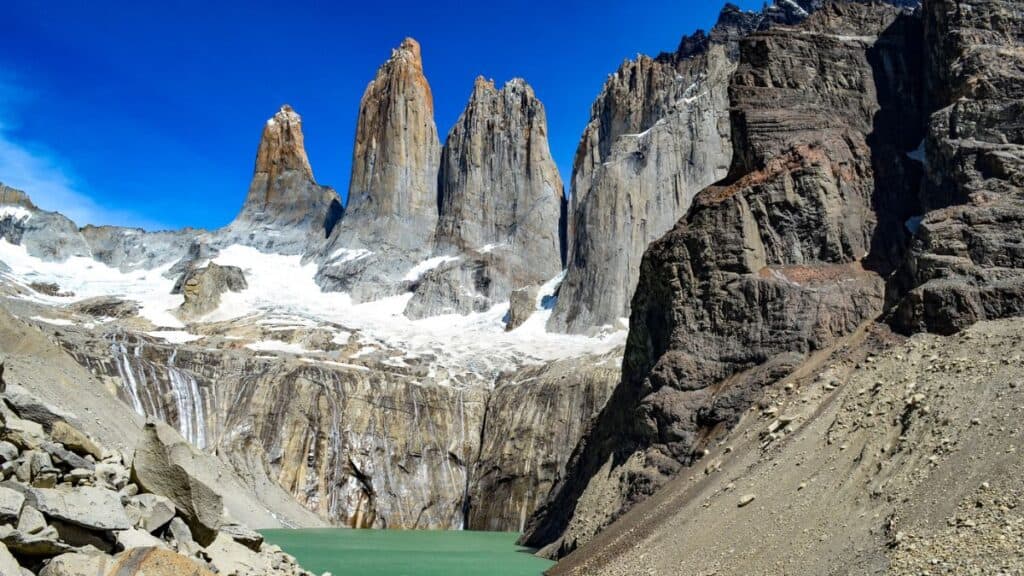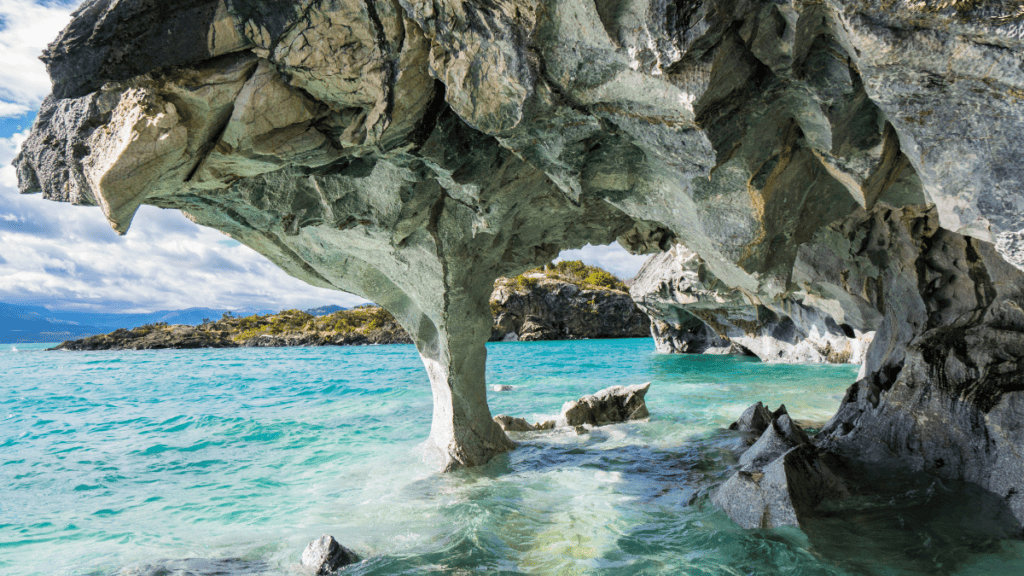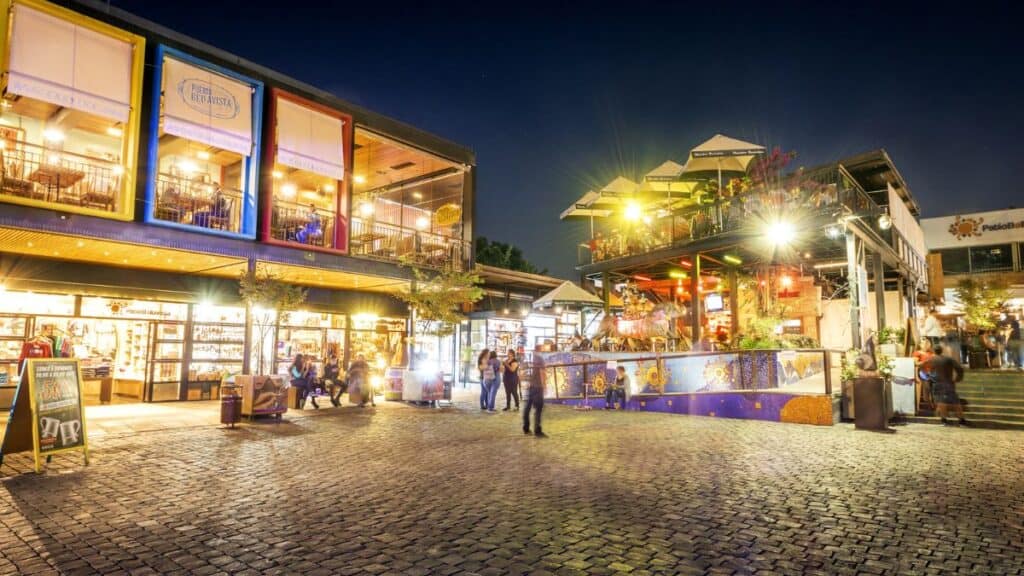When should you visit Chile? While it depends on your travel destination, style, and goals, it’s important to know when is actually the best time to visit Chile.
You may be a nature buff, an archaeology buff, a hiking enthusiast, a wildlife lover, a beach bum, an adventure junkie, or a wandering foodie–Chile has it all for you.
The first thing that makes Chile unique is its geography as the longest and narrowest country in the world. When it comes to nature, Chile has everything from deserts to lakes to beaches for adventure seekers.
The country is full of natural attractions, but that is not the only thing that makes it famous. You can find many different historical and UNESCO World Heritage sites. If that is not enough for you as a traveler, the wildlife diversity will surely excite you. Chile is home to llamas, elephant seals, Patagonian pumas, penguins, alpacas, and many more animals and birds.
Lastly, you can’t talk about Chile without mentioning its local cuisine. Empanadas, Pastel de Chócolo, Pebre, Asada, and many different kinds of seafood in Chile are mouthwatering. However, these can only be experienced if you choose the best time to visit the country.
What is the Best Time To Visit Chile?
1. Summer (December to February)
Summer is the high season when most local and international travelers move towards popular tourist attractions. It is the season when you can get the best experience in Chile. All the activities and sites will be accessible and open, as the temperatures will mostly be around 58° to 79° Fahrenheit (14° to 26° Celsius).
The only downside of visiting this season is the crowds. Most accommodation places will be booked by the time you reach Chile, so make sure you book everything in advance to have options and keep the budget down.
Best Activities and Areas to Experience in Chilean Summer
From the mountainous region of Patagonia to deserted areas of the Atacama Desert, all the popular tourist destinations are accessible in summer.
Chilean Patagonia is best explored in summer, specifically from mid-November to early March, when hiking the breathtaking trails in Torres del Paine National Park could be done optimally.

Don’t forget beach combing, river rafting, and trekking in Chile’s Lakes District, among the country’s top activities. And visit Easter Island for the Tapati Rapa Nui Festival; although Easter Islands can be visited all year round, the festival can only be experienced in February.
2. Spring (September to November)
Spring is arguably the best season to visit Chile alongside summer. The temperatures vary between 40° F to 75° F (4° to 24° C) in most parts of the country. The chances of rain increase a bit compared to summer, but it doesn’t affect the overall experience.
Most areas in this season are accessible; however, it is advised to pack some warm clothes as temperatures can get lower at night.
Best Activities and Areas to Experience in Chilean Spring
For the people visiting Chile in spring, we highly recommend you explore the volcanoes and lakes. Just move towards northern Chile and visit as many places as possible.
Places like La Sarena, Atacama Desert, and Elqui Valley are sights to behold. The main highlight of these places is stargazing at Atacama and Elqui and swimming at the serene beaches of La Serena. For more of nature’s wonderful beauty, visit Parque Nacional Llanos in the Atacama region to experience the best blooms of the year.
When you want to discover the rest of Chile and Patagonia, it is possible to do it in late spring. Just be aware that when you want to visit the Marble Caves more to the South or Valparaiso at the coast, the weather may vary more heavily, and you may have to spend more time waiting for good weather.

The crowds in the spring are also quite low compared to summer, which is another great reason to travel.
3. Fall/Autumn (March to May)
The fall season is the best if you are looking for the beauty of nature in the major cities of Chile. The fall foliage produces colors that are stunning to behold in mild temperatures between 40° F to 80° F (4° to 27° C).
However, the chances of rain increase drastically as the fall season sees around 10 to 50 millimeters (0.39 to 2 inches) of rainfall. It is also why you won’t see a lot of crowds, allowing you to explore the cities in peace.
Best Activities and Areas to Experience in Chilean Fall
Fall is also regarded as the harvest season, so it is a great time to visit the vineyards spread throughout the country. Some of the best places to experience Chilean wines are Colchagua Valley and Maipo Valley.
For nature lovers, head to the Southern Chilean region towards Chiloe Island. Here, tourists often visit Patagonia for hiking. Fall is the last season to hike before parks and roads close for winter.
4. Winter (June to August)
From June to August, the country hits the lowest temperatures of the year. Although it is regarded as the least preferable time to visit Chile, winter comes with its own unique experience of the place. Snow sports is one of many activities to mention.
The temperatures remain around 37° F to 61° F (3° to 16° C). with rainfall around 1.6 to 3 in (40 to 80 mm). Many hotels and other accommodation options in mountainous regions remain closed during winter, and the available ones can be booked cheaply.
National parks like Torres del Paine aren’t closed but can only be visited with a guide, making the experience more costly. Besides that, there’s a lot of snowfall in the country, making getting around time-consuming and preventing you from doing all activities.
Best Activities and Areas to Experience in Chilean Winter
If you visit Chile in winter, the best place would be the mountains for skiing. Many resorts, such as El Colorado, Valle Nevado, and Ski Portillo, offer numerous sports activities, such as snowshoeing, snowboarding, and skiing. Make sure that you check the accessibility before planning to visit any mountainous region in winter.
What is The Cheapest Time To Visit Chile?
If you want the ultimate Chile experience without spending too much money, we highly recommend visiting during the spring (September to November) or fall (March to May) season. It is the time when the prices aren’t as high as in the summer season, and the crowds are minimal.
In spring and fall, almost all of the popular tourist destinations are accessible. However, you must check the weather before visiting areas like Patagonia and Torres del Paine National Park. These areas have highly unpredictable weather that would leave you soaking wet in rain if you are not careful.
The accommodation options in big cities like Valparaiso and Santiago will be much cheaper during these seasons than in summer. Many festivals and events are held in spring and fall, adding to a great experience on a lower budget.

What is The Least Busy Time To Visit Chile?
The least busy time to visit Chile is the winter season. Due to cold temperatures, most tourists avoid visiting Chile during this time. However, it doesn’t mean that it doesn’t have its upsides. Hotels in the big cities will be available at a much cheaper price, and the flights will be much better due to fewer tourists visiting the country.
A city we will recommend for you to visit in winter is Santiago. It has a different climate than the rest of Chile, which makes it a good spot to visit in winter. Another great place to visit is the Andes Mountains for snow sports. Many people are not really into such activities due to their difficulty level, which is why you will experience the lowest number of tourists in the country between June to August.
Tips for Making Safe the Most of Your Chilean Vacation
- Safety First
Chile is pretty safe for tourists. The crime rate in Chile is low. Stick to tourist-friendly areas, and you won’t find trouble. The only neighborhoods you should avoid are mostly in Santiago, the city’s capital. These include Vitacura, Las Condes, and Providencia.
Additionally, consider protecting yourself with travel insurance such as SafetyWing, which can cover medical emergencies, trip cancellations, and other unforeseen incidents during your stay. Use the widget below to snag the perfect policy for your needs and travel with peace of mind knowing you’ve got your back covered, no matter what adventures come your way!
- When in Chile…
Chile’s culture is a bit different from other parts of the world. The best example is their mealtimes. Chileans usually eat a very light breakfast, followed by lunch and dinner, eaten later than usual.
On the other hand, the language spoken in Chile is not the traditional Spanish you will hear worldwide. Its vocabulary is much denser, and they speak very fast. However, an upside is that more people speak fluent English than in other Latin American countries.
- Earthquakes, Flooding, and Other Natural Disasters
One of the most seismically active countries in the world, Chile is located where three tectonic plates meet, so earthquakes are highly likely. However, it is less of a concern nowadays since structures in Chile have been built with this natural phenomenon in mind.
Along with the crime situation and safety concerns, keep an eye out for government advisories on weather and emergency updates to make your stay trouble- and stress-free.
- Packing Tips
The seasons in Chile are quite the opposite to many countries, as it’s located in the Southern Hemisphere. The best time to visit Hawaii or Bali might not be the best time to visit Chile. It is because winters in most areas of the world are actually summers in Chile. For that reason, packing should be done while keeping the Chilean season in consideration.
Frequently Asked Questions (FAQs) – Best Time To Visit Chile
What Is the Best Time of the Year To Visit Santiago, Chile?
The best time to visit Santiago, Chile, is from September to February. These are the summer months in the city. Please note that it can get very hot in the city in February, making it a consideration to get a room with air conditioning when you book your holidays.
What Is the Hottest Month in Chile?
The hottest months in Chile are January and February, with an average high temperature of 86° F (30° C), during the Southern Hemisphere summer. During these months, Chile’s central and northern regions, which are closer to the equator and have more arid climates, experience high temperatures.
How Many Days Is Enough in Chile?
A two-week trip would be enough to cover most of the popular tourist spots in Chile. However, if you want to explore more, three to four weeks would be enough to provide you with a complete experience without much exhaustion.
Conclusion – Best Time To Visit Chile
While any season is a good time to visit Chile, the variety of activities and the warm, pleasant weather during summer appears to be the best season to head out to this South American country.
Summer in Chile coincides with winter in the Northern Hemisphere, a fact that seasonal travelers searching for warmer climes can take advantage of. The downside is that summer is also the peak season for tourists, so expect much traffic compared to other less popular seasons.
The bottom line is this: the right time to go to Chile depends on your desired destination, activities, travel style, and preferences. Plan your holidays to Chile accordingly and enjoy.
Your Ultimate Travel Guide & Booking Resources
Skyscanner is my trusted ally for booking flights, guiding me to the perfect travel options while making the journey planning process a breeze with its user-friendly interface and extensive search capabilities.
12Go Asia is my ultimate travel companion in Asia, offering the best budget service platform for seamless booking of trains, buses, ferries, and flights, ensuring every adventure unfolds smoothly and effortlessly.
Booking.com is my ultimate lodging partner. It offers many accommodations worldwide and simplifies my travel experiences with its user-friendly platform and unbeatable deals.
Get Your Guide is my go-to for personalized travel experiences, enriching my journeys with unique tours and activities curated to my interests, making every adventure unforgettable and tailored to my preferences.
SafetyWing is my peace of mind on the go, offering comprehensive travel medical insurance with affordable plans and hassle-free claims, ensuring I can explore the world worry-free, knowing I’m protected wherever I roam.
LifeStraw Go Bottle is my trusted hydration companion for outdoor adventures, filtering water on-the-go to keep me safe and hydrated, ensuring every hike or travel experience is worry-free and enjoyable.
Related reads:
- Best Time To Visit Argentina: Must-Try Activities in Each Season
- Best Time To Visit Peru: Seasons of the Year & Best Activities To Do
Founder of Spark Nomad, Radical FIRE, Copywriter
Expertise: Personal finance and travel content. I’m a full-time traveler, and I’ve been to 49 countries and 5 continents.
Education: Bachelor of Economics at Radboud University, Master in Finance at Radboud University, Minor in Economics at Chapman University.
Over 200 articles, essays, and short stories published across the web.
Marjolein Dilven is a journalist and founder of Spark Nomad, a travel platform, and Radical FIRE, a personal finance platform. Marjolein has a finance and economics background with a master’s in Finance. She has quit her job to travel the world, documenting her travels on Spark Nomad to help people plan their travels. Marjolein Dilven has written for publications like MSN, Associated Press, CNBC, Town News syndicate, and more.

